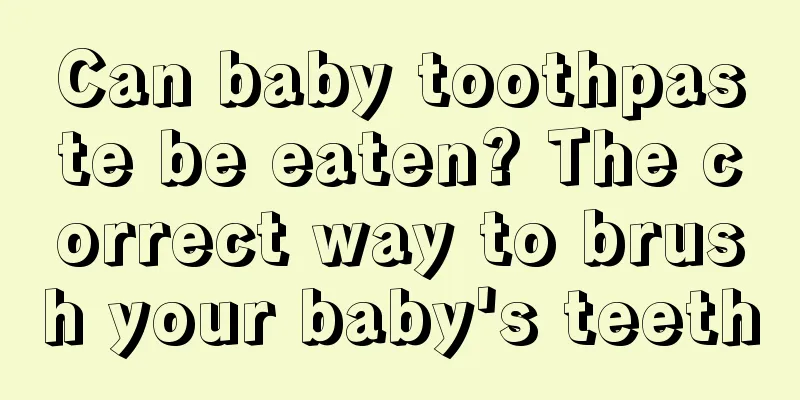When to teach your baby to urinate and defecate, you need to start from these points

|
It is something that all parents look forward to their babies being able to go to the toilet by themselves. Babies have been using diapers since birth, so changing diapers for children is a compulsory course for parents. However, as they grow older, children need to go to the toilet by themselves. The following editor of No. 5 website will show you when to teach babies to urinate and defecate? When to teach your baby to urinate and defecate①The baby shows interest in the bathroom and how mom and dad use the bathroom. ② The baby will express the discomfort after the diaper or pants are wet through words or actions. ③The baby can express the desire to urinate or defecate verbally or through actions. ④The baby’s daily bowel movement time begins to become regular. ⑤The baby's diapers can stay dry for more than two hours. How old is the baby?How old the baby is to urinate and defecate varies from person to person. Generally, the awareness of urination and defecation will be formed when the baby is 2-3 years old. The baby usually has a better understanding of defecation when he is 1 and a half years old, and the baby can be trained at this time. Generally speaking, most children can learn to signal adults when they want to defecate between 2.5-3.5 years old, and the situation of soiling pants during the day will become less and less. At night, even if parents do not conduct any training and intervention for their children, many babies will stop defecating from 6 months to one year old. Most children will basically not wet the bed at night when they are 3 years old. About 20% of children will still wet the bed when they are 5 years old. How to teach your baby to urinate and defecateSTEP1 Send a "defecation signal" When teaching your baby to use the toilet, you should first teach your baby to learn to send out "defecation signals" by themselves. This can be physical, such as squeezing your legs together, or verbal "shhh" or "poop" to tell parents that they want to go to the toilet. Toilet tips: It is best to place the baby's toilet chair in the bathroom or in the baby's own room. If the baby is willing to open up his "playground" in the living room, the toilet chair can also be placed near him. The best way to place the toilet chair is to follow the "proximity principle". STEP2 Take off your pants Take your baby to the toilet and let him learn to take off his pants by himself and pull them down to his feet. If the baby does well, parents should praise and encourage him in time. After he has mastered taking off pants with elastic bands, he can practice taking off more complicated pants. Toilet tips: If a boy wants to urinate, he needs to take off his pants to the middle of his thighs, spread his legs, take out his penis, and urinate without getting his clothes wet. STEP 3 Sit on the toilet Take your baby to the toilet and let him gradually get familiar with his own urine bucket or toilet chair. Take him to sit there frequently without pulling down his pants. Just let him get used to sitting on it. Once your baby understands the concept of the potty, you can proceed with the following steps. Toilet tips: Sometimes young babies don’t realize they have to defecate. In this case, you can let them sit down without pulling down their pants, so that they will have the awareness of using the potty. STEP 4 Defecation Turn on the tap and let the baby defecate while listening to the sound of water. Let the baby maintain a certain posture, and then use the sound of "shush" to induce the baby to urinate; use the sound of "hmm, hmm" to encourage the baby to defecate. Toilet tips: If you want your baby to develop good toilet habits, do not let your baby play with toys or eat when he uses the potty to urinate or defecate. Be careful to avoid your baby sitting on the potty for a long time to form habitual constipation. STEP5 Clean your butt Train your baby to clean his bottom by himself. At the beginning, parents can do it for the baby, letting the baby lift up his bottom so that parents can clean his bottom. But when the baby is a little older, you should let the baby learn to clean his bottom by himself. Toilet tips: Let the baby pull up his underwear and outer pants, and parents can help to tidy up the pants. You can teach him to defecate on the adult toilet. After defecation, teach the baby to cover the toilet lid and flush it, so as to develop good hygiene habits. STEP 6 Wash your hands Take your baby to the sink, turn on the tap, let your baby wash his hands, and then dry his hands with a hand towel. It is best to develop a hygienic habit of washing hands after going to the toilet every time. Toilet tips: When your baby can successfully complete the defecation process or makes progress, you should give appropriate praise. These words of praise can make your baby feel comfortable and quick when going to the toilet. Otherwise, it will be counterproductive. Misconceptions about teaching your baby to urinate and defecate1. Children should be trained from an early age and should urinate frequently. They should not wear diapers all day long. This is not good for the baby's development, especially for the boy's penis. 2. My child started to urinate when he was one month old. He never wets his diaper all day long. He knows how to control it. And my baby seems to know when he needs to urinate and will send out a signal. 3. You need to develop a habit of helping him pee at the right time. Gradually he will tell you when he needs to pee. |
Recommend
How to judge a man's sperm quality from his appearance
Sperm quality is related to the growth of the nex...
How long is the shelf life of Baoning soap? How to check the shelf life of Baoning soap?
Baoning soap is very popular in China. Many mothe...
What are the early symptoms of congenital heart disease in children and how to treat them for free?
Some babies are born with congenital defects, suc...
What are the necessary items for postpartum recovery? Is it necessary to do postpartum recovery?
Pregnancy and childbirth are something that almos...
Why do babies like to bite their nails? What is going on when babies bite their nails?
Many mothers are very sensitive to all kinds of b...
How much fluoride does China toothpaste contain? Is it normal for China toothpaste to be blue?
Toothpaste contains some fluoride, so how much fl...
What season is good for weaning your baby? How to wean your baby?
Weaning your baby is a headache for mothers. When...
Where is the baby's fontanelle? Where is the fontanelle?
The fontanelle is an organ on the baby's head...
What should I do if my child keeps coughing? How can I stop my child's cough quickly?
Children usually don't know how to take care ...
What are the causes of miscarriage?
Pregnancy is a wonderful thing, but sometimes it ...
When is the best time for newborns to supplement calcium? When does the umbilical cord of a newborn fall off?
Newborn babies develop very quickly. Many parents...
Is it better for parturients to have a caesarean section or a natural birth? What should parturients pay attention to during a caesarean section?
For expectant mothers who are about to give birth...
What characters should be avoided when naming a baby girl? How to name a baby girl based on her birth date?
There are many ways to name a baby. Every family ...
Can dandelion remove fetal toxins? What can I eat to remove fetal toxins?
Dandelion is a plant that many people like to pla...
How to treat malnutrition in one-year-old babies? How to prevent malnutrition in babies
The body of a one-year-old baby is still relative...









